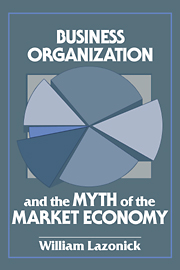Book contents
- Frontmatter
- Contents
- List of figures
- Acknowledgments
- Introduction: the wealth of three nations
- PART I Economic institutions and economic performance
- 1 Institutional foundations of industrial dominance and decline
- 2 Organizations and markets in capitalist development
- 3 Business organization and competitive advantage
- PART II Intellectual foundations and intellectual constraints
- PART III The “marvels of the market” versus the “visible hand”
- PART IV Overcoming intellectual constraints
- Index
2 - Organizations and markets in capitalist development
Published online by Cambridge University Press: 01 April 2010
- Frontmatter
- Contents
- List of figures
- Acknowledgments
- Introduction: the wealth of three nations
- PART I Economic institutions and economic performance
- 1 Institutional foundations of industrial dominance and decline
- 2 Organizations and markets in capitalist development
- 3 Business organization and competitive advantage
- PART II Intellectual foundations and intellectual constraints
- PART III The “marvels of the market” versus the “visible hand”
- PART IV Overcoming intellectual constraints
- Index
Summary
Organizations and markets
The historical experience of capitalist development demonstrates the growing importance of organizational coordination relative to market coordination in the value-creation process. To be sure, market exchange remains a distinctive feature of advanced capitalist economies. But to construct a historically relevant theory of the capitalist economy requires an analysis of the evolution of the relation between organizations and markets in particular historical contexts and identification of the impacts of the organization–market relation on national value-creating capabilities. Given the underdeveloped state of current debate on the microeconomic institutions that promote economic growth, the analysis must begin with basics.
What is it that distinguishes a market from an organization? The defining social characteristic of a market is the impersonal relation between buyer and seller. Both sides pursue their self-interests independently of one another, both in specifying their goals and in engaging in activities to achieve those goals. The impersonality of the market is manifested by the willingness of sellers of goods and services to enter into exchange with the highest bidders. As long as a buyer has the purchasing power to pay the highest price, his or her identity is of no concern to the seller.
A seller's identity is of concern to the buyer only insofar as the personal (or “firm-specific”) capabilities of the seller in some way enter into the use-value of the good or service to be bought. Even then, in a market process, buyers have no ongoing commitments to purchase from particular sellers.
- Type
- Chapter
- Information
- Business Organization and the Myth of the Market Economy , pp. 59 - 91Publisher: Cambridge University PressPrint publication year: 1992



